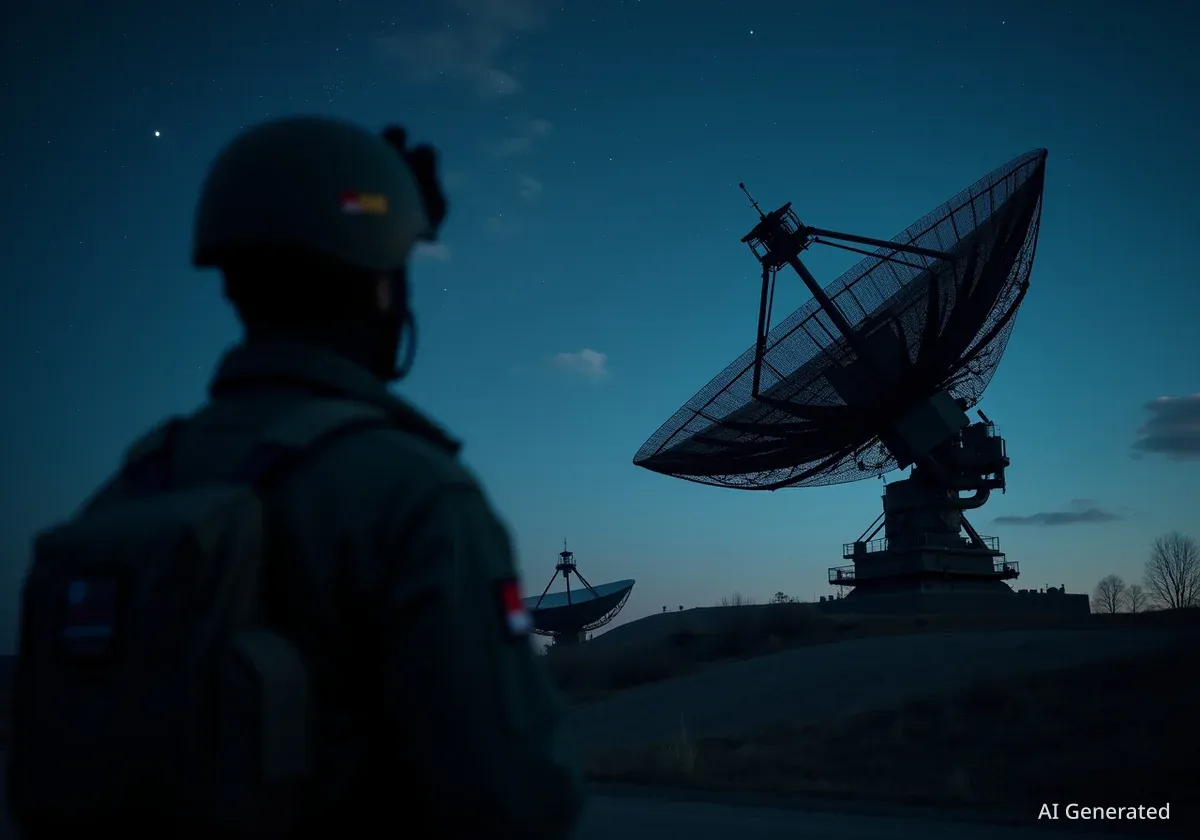Germany is considering developing offensive capabilities in space, a significant shift in its defense policy. This decision comes after German Defense Minister Boris Pistorius revealed that Russian spacecraft are tracking two communications satellites used by the German military. The move signals a growing concern within Germany and NATO about the militarization of space by countries like Russia and China.
The announcement, made at the German industry's Space Congress in Berlin, highlights a new strategic direction for Germany's defense posture in orbit. For decades, Germany has avoided anti-satellite weapons, relying on allies for key space defense. Now, the country plans to invest significantly in space security, aiming to become a stronger pillar within NATO and the European Union's space initiatives.
Key Takeaways
- Germany is reversing its long-standing policy against offensive space capabilities.
- Russian spacecraft are tracking German military communications satellites.
- Germany plans to invest 35 million euros in space security by 2030.
- The country aims to enhance its role in NATO and EU space defense.
- Russia and China are rapidly expanding their space warfare capabilities.
Germany's Shift Towards Space Defense
Defense Minister Boris Pistorius stated on Thursday that Germany must address the evolving threats in space. He emphasized that Russia and China have significantly advanced their capacity for space warfare. These capabilities include jamming, blinding, manipulating, and kinetically destroying satellites.
Pistorius highlighted the critical nature of space in modern conflicts. He noted that satellite networks are now an "Achilles heel" for modern societies. Attacking these networks can paralyze entire countries. This perspective underscores the urgency of Germany's policy change.
"Russia and China already occupy important strategic hills and mountains in space—a threat we can no longer ignore."
Boris Pistorius, German Defense Minister
The minister confirmed Germany's readiness to take on more responsibility for defense and deterrence in space. The country plans to allocate 35 million euros (approximately $40.8 million) to space security by 2030. This investment will focus on several key areas.
Investment Focus Areas
- Satellite constellations for early warning and reconnaissance
- Improved ground stations
- Secure launch capabilities
- Enhanced cybersecurity measures for space assets
- Radars and telescopes for tracking orbital traffic
Considering Offensive Options
A major part of this policy shift involves discussing offensive capabilities in space. This marks a departure from Germany's previous stance, which opposed anti-satellite weapons. Historically, Germany relied on the United States and other European nations for critical space services like missile warning and intelligence gathering.
Germany's military, known as the Bundeswehr, has primarily focused on developing its own radar surveillance satellites. These satellites operate within data-sharing agreements with allied countries. The new approach reflects a desire for greater independence and a more robust defense posture.
Historical Context
Christian Mölling, former research director at the German Council on Foreign Relations, noted in 2022 that German politicians previously showed little interest in space beyond existing infrastructure. He suggested that Germany needed to actively pursue higher political ambition and military potential in space to gain a stronger profile within the EU and NATO.
Pistorius confirmed that Germany seeks to achieve exactly this. He stated that Germany's contributions to space security would establish it as a "strong pillar in NATO." These efforts will also complement existing European Union programs.
International Cooperation and European Independence
Germany is actively pursuing collaborations to strengthen its space defense. A recent agreement with France involves cooperation on a satellite-based missile warning network. This new system aims to reduce Europe's reliance on the United States for such critical capabilities.
According to Pistorius, Germany plans to acquire new satellite constellations for early warning, reconnaissance, and communications. This strategic acquisition is part of a broader European effort to enhance space independence.
IRIS² Constellation
Germany is a partner in the European Union's planned IRIS² constellation. This project aims to deploy nearly 300 satellites, creating an independent European satellite network. It would function as a smaller alternative to commercial networks like SpaceX's Starlink. However, German officials have expressed concerns about the estimated cost of $12.3 billion (10.6 billion euros) for the program, suggesting Germany might also seek its own national constellation.
A fully independent European space program also requires a more robust launch industry. Europe's new Ariane 6 rocket has successfully completed three flights, reducing the need for European governments to use US-based rockets like those from SpaceX for military satellite launches.
However, unlike SpaceX's reusable rockets, the Ariane 6 and the smaller Italian Vega C rocket are not reusable. This design choice results in higher costs and lower flight rates. Pistorius emphasized that Germany requires "secure, on-demand space transport capacities." These capacities should include a mix of small and heavy-lift launchers developed through competition.
There is a growing interest across Europe to increase defense spending. European leaders feel they can no longer solely rely on the United States for security. Earlier this year, Germany's new Chancellor, Friedrich Merz, proposed that Germany, France, and the United Kingdom explore cooperation on a European nuclear deterrent. This could potentially replace the existing US commitment to protect European territory.
Russia's Activities in Orbit
Pistorius specifically highlighted Russia as a significant concern for Germany. He revealed that Russia is positioning its reconnaissance satellites close to space systems used by the German Armed Forces and allied nations. "Currently, two Intelsat satellites, which are also used by the German Armed Forces, are being tracked by two Russian Luch/Olymp reconnaissance satellites," Pistorius stated.
Intelsat is a global communications satellite operator. It provides connectivity to commercial and government clients. Its fleet includes approximately 57 satellites in geosynchronous orbit, roughly 36,000 kilometers (22,000 miles) above the equator. Satellites in this orbit move at the same speed as Earth's rotation, allowing them to remain over a fixed geographical area.
Commercial and military geosynchronous satellites typically stay in the same orbital slot for years, providing continuous communication services. Russia's two Olymp satellites, also known as Luch, operate differently. Since their launches in 2014 and 2023, these satellites have moved across geosynchronous orbit. They routinely change longitude and move between slots, often lingering near Western-owned communications satellites for several months.
Western analysts believe the Luch/Olymp satellites likely aim to eavesdrop on signals transmitted through other spacecraft in geosynchronous orbit. Analysts at the Center for Strategic and International Studies (CSIS) suggested last year that these satellites might also be testing concepts for future orbital attacks. Some speculate they could carry electronic attack payloads for jamming.
"Trying to listen to one's neighbor is not only unfriendly. It's called an act of espionage."
Florence Parly, former French Defense Minister (2018)
US officials and government leaders from other Western nations have previously raised alarms about the Luch/Olymp satellites. The first Luch/Olymp satellite approached several Intelsat satellites in 2015. It later spent time near a French-Italian military satellite in 2017. Florence Parly, then France's defense minister, described the Russian satellite as having "big ears" but being "a bit indiscreet."
In 2018, Parly commented on the Russian satellite's close approach: "It got close. A bit too close. So close that one really could believe that it was trying to capture our communications."
Recent Russian Maneuvers
Russia launched a second Luch/Olymp satellite into geosynchronous orbit in 2023. This satellite then moved near a US military communications satellite and multiple spacecraft owned by the French operator Eutelsat. Last September, this second Russian eavesdropping satellite maneuvered close to Intelsat 10-02.
According to a CSIS space threat assessment, it came as close as 1 kilometer (about 3,300 feet) from Intelsat 10-02 in January. Notably, Intelsat 10-02 was docked with a commercial servicing spacecraft at the time. It was ironically launched by a Russian rocket in 2004.
The same Luch/Olymp satellite then used its thrusters to drift thousands of miles away. It then positioned itself next to another Intelsat satellite, Intelsat 39. Both Intelsat 10-02 and Intelsat 39 provide C-band and Ku-band services across Europe and the Middle East, including Ukraine.
Beyond satellite tracking, a Russian cyberattack also disrupted a ViaSat satellite communications network. This occurred on the eve of Russia's invasion of Ukraine in 2022. These actions demonstrate Russia's willingness to use space-related capabilities in conflicts.
Similar Activities by Other Nations
It is important to note that the US government has also used roving satellites for surveillance of other spacecraft in geosynchronous orbit. These satellites are often so secret that the US government declines to identify the owning agency. Similarly, Russia has kept the true purpose of its Luch/Olymp satellites concealed. The name 'Luch,' meaning 'beam' in Russian, was previously used for civilian data relay satellites.
The head of French Space Command, Maj. Gen. Vincent Chusseau, warned last week of increasing "hostile or unfriendly" activity in space. He emphasized accelerating the ability to carry out "a wide spectrum of effects in space." This includes not only observation and understanding but also direct action. French Space Command officials also aim to acquire "surface-to-space capabilities to deny, prohibit, and disrupt adversaries." US Space Force officials have similarly indicated a growing need for offensive space weapons.





